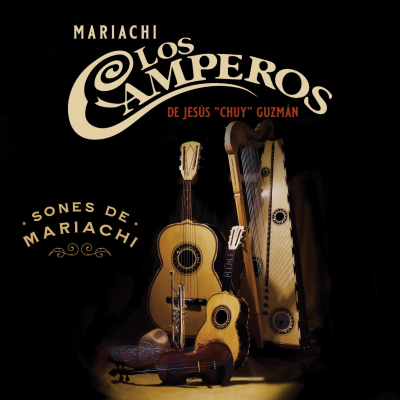|
About Mariachi Los Camperos and Sones de Mariachi
“The Los Angeles-based Mariachi Los Camperos is considered by many to be the finest mariachi ensemble in the world. Undoubtedly, it has played a central role in the United States in raising both the artistic standards and the public perceptions of mariachi music, which is now recognized by UNESCO as a masterpiece of Intangible Cultural Heritage of Humanity.” —The National Folk Festival
Los Angeles–based Mariachi Los Camperos’ abundant accolades and performances on premier concert stages can easily obscure the fact that its leaders come from humble roots, deep within a mariachi tradition. The group’s founder, Nati Cano, was a third-generation mariachi musician from the Mexican state of Jalisco. He lived his dream, forging his own mariachi group in 1961 from his artistic vision and determination. Until his death in 2014, he challenged the attitudes that, during his youth in Mexico, led formally trained musical peers to look down on his beloved rural and working-class music. In the words of Jesús “Chuy” Guzmán, his disciple and successor as Camperos leader, “He wanted to have a mariachi that would have dignity, that would have heart, that would have soul, and he made Los Camperos.”
“I owe a lot to Mr. Cano,” says Guzmán. “He was my tutor; he was my artist. Really, he was everything for me. He guided me. He would tell me, ‘Look, when [you write arrangements], look for simplicity.... The song is already there. Look for a touch-up.’” By 1992, Guzmán was arranging pieces for Mariachi Los Camperos under Cano’s supervision, and his talents grew rapidly. Guzmán’s creativity was key to the Grammy-nominated albums Llegaron Los Camperos: Concert Favorites of Nati Cano’s Mariachi Los Camperos (2006) and Tradición Arte y Pasión: Mariachi Los Camperos de Nati Cano (2015), as well as Grammy-winning Amor, Dolor y Lágrimas: Mariachi Los Camperos de Nati Cano (2008) and De Ayer Para Siempre (2019). In 2014, Nati Cano performed his last show with Mariachi Los Camperos before he lost his battle with cancer.
Mariachi Los Camperos’ newest album, Sones de Mariachi, is a high-spirited and upbeat collection that features a variety of sones and includes many well-known mariachi classics. The mariachi son is a fast-paced genre of mariachi music that heavily utilizes the guitar-playing section to create complex rhythms. Its bright and colorful sound captivates listeners, immersing them in an energizing experience. Los Camperos takes the classics on this album and reinvigorates them with fresh, energy-packed arrangements. While the collection was initially intended to include huapangos, sones tamaulipecos jarochos, and huastecos, Los Camperos decided to focus on the pure mariachi sound. According to Guzmán, “This album identifies with the mariachi tradition, and what identifies mariachi tradition is the son.” In addition to featuring sones from Jalisco, the album explores sones from the Mexican states of Michoacán, Guerrero, Colima, Guanajuato, and Nayarit. By educating their audiences about the importance of the son to the foundations of mariachi, Los Camperos stays true to their founding ethos of preserving and cultivating interest in mariachi and the culture from which it springs.
For over half a century, Los Camperos has been bringing life to mariachi music from Mexican history on twelve passion-filled albums, five of which were released by Smithsonian Folkways. Their previous album, De Ayer Para Siempre, was released in 2019 and revitalizes classic sones, rancheras, and boleros with artistry and ingenuity. This album also features medleys, known as popurrís, that honor and highlight the work of influential composers.
An essential component of Mariachi Los Camperos’ mission is nurturing future generations’ passion for mariachi music. The group actively engages in educating young people about the rich heritage and significance of mariachi music, empowering them to explore Mexican culture and their own musical side. Every year, Mariachi Los Camperos leads numerous workshops that open up the minds of young people to the joys of mariachi. Multiple members of Los Camperos, including Guzmán and Sergio “Checo” Alonso, also hold teaching positions at high schools and colleges, extending their commitment to mariachi music education and encouraging young people to pursue their passions.
Today, Guzmán leads the Los Camperos legacy, providing the vision for its sound and repertoire. He continues Cano’s work of teaching the tradition throughout the United States and beyond. Looking back on his career, he says, “I’m not going to tell you that the work was easy, but... I feel good about what has happened in my life, in my path as a musician.” Looking ahead, he adds, “There’s still a lot to do.... My dream will come to an end [only] when I am gone.” Mariachi Los Camperos stands as a beacon of cultural heritage, preserving the traditional roots of mariachi music by expounding on the heart and soul that have saturated these songs for generations.
|


